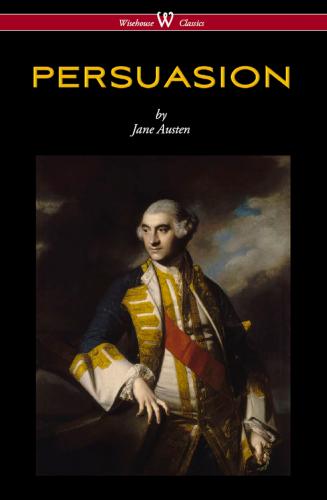She would have liked to know how he felt as to a meeting. Perhaps indifferent, if indifference could exist under such circumstances. He must be either indifferent or unwilling. Had he wished ever to see her again, he need not have waited till this time; he would have done what she could not but believe that in his place she should have done long ago, when events had been early giving him the independence which alone had been wanting.
Her brother and sister came back delighted with their new acquaintance, and their visit in general. There had been music, singing, talking, laughing, all that was most agreeable; charming manners in Captain Wentworth, no shyness or reserve; they seemed all to know each other perfectly, and he was coming the very next morning to shoot with Charles. He was to come to breakfast, but not at the Cottage, though that had been proposed at first; but then he had been pressed to come to the Great House instead, and he seemed afraid of being in Mrs Charles Musgrove’s way, on account of the child, and therefore, somehow, they hardly knew how, it ended in Charles’s being to meet him to breakfast at his father’s.
Anne understood it. He wished to avoid seeing her. He had inquired after her, she found, slightly, as might suit a former slight acquaintance, seeming to acknowledge such as she had acknowledged, actuated, perhaps, by the same view of escaping introduction when they were to meet.
The morning hours of the Cottage were always later than those of the other house, and on the morrow the difference was so great that Mary and Anne were not more than beginning breakfast when Charles came in to say that they were just setting off, that he was come for his dogs, that his sisters were following with Captain Wentworth; his sisters meaning to visit Mary and the child, and Captain Wentworth proposing also to wait on her for a few minutes if not inconvenient; and though Charles had answered for the child’s being in no such state as could make it inconvenient, Captain Wentworth would not be satisfied without his running on to give notice.
Mary, very much gratified by this attention, was delighted to receive him, while a thousand feelings rushed on Anne, of which this was the most consoling, that it would soon be over. And it was soon over. In two minutes after Charles’s preparation, the others appeared; they were in the drawing-room. Her eye half met Captain Wentworth’s, a bow, a curtsey passed; she heard his voice; he talked to Mary, said all that was right, said something to the Miss Musgroves, enough to mark an easy footing; the room seemed full, full of persons and voices, but a few minutes ended it. Charles shewed himself at the window, all was ready, their visitor had bowed and was gone, the Miss Musgroves were gone too, suddenly resolving to walk to the end of the village with the sportsmen: the room was cleared, and Anne might finish her breakfast as she could.
“It is over! it is over!” she repeated to herself again and again, in nervous gratitude. “The worst is over!”
Mary talked, but she could not attend. She had seen him. They had met. They had been once more in the same room.
Soon, however, she began to reason with herself, and try to be feeling less. Eight years, almost eight years had passed, since all had been given up. How absurd to be resuming the agitation which such an interval had banished into distance and indistinctness! What might not eight years do? Events of every description, changes, alienations, removals—all, all must be comprised in it, and oblivion of the past—how natural, how certain too! It included nearly a third part of her own life.
Alas! with all her reasoning, she found, that to retentive feelings eight years may be little more than nothing.
Now, how were his sentiments to be read? Was this like wishing to avoid her? And the next moment she was hating herself for the folly which asked the question.
On one other question which perhaps her utmost wisdom might not have prevented, she was soon spared all suspense; for, after the Miss Musgroves had returned and finished their visit at the Cottage she had this spontaneous information from Mary:—
“Captain Wentworth is not very gallant by you, Anne, though he was so attentive to me. Henrietta asked him what he thought of you, when they went away, and he said, ‘You were so altered he should not have known you again.’”
Mary had no feelings to make her respect her sister’s in a common way, but she was perfectly unsuspicious of being inflicting any peculiar wound.
“Altered beyond his knowledge.” Anne fully submitted, in silent, deep mortification. Doubtless it was so, and she could take no revenge, for he was not altered, or not for the worse. She had already acknowledged it to herself, and she could not think differently, let him think of her as he would. No: the years which had destroyed her youth and bloom had only given him a more glowing, manly, open look, in no respect lessening his personal advantages. She had seen the same Frederick Wentworth.
Конец ознакомительного фрагмента.
Текст предоставлен ООО «ЛитРес».
Прочитайте эту книгу целиком, купив полную легальную версию на ЛитРес.
Безопасно оплатить книгу можно банковской картой Visa, MasterCard, Maestro, со счета мобильного телефона, с платежного терминала, в салоне МТС или Связной, через PayPal, WebMoney, Яндекс.Деньги, QIWI Кошелек, бонусными картами или другим удобным Вам способом.
